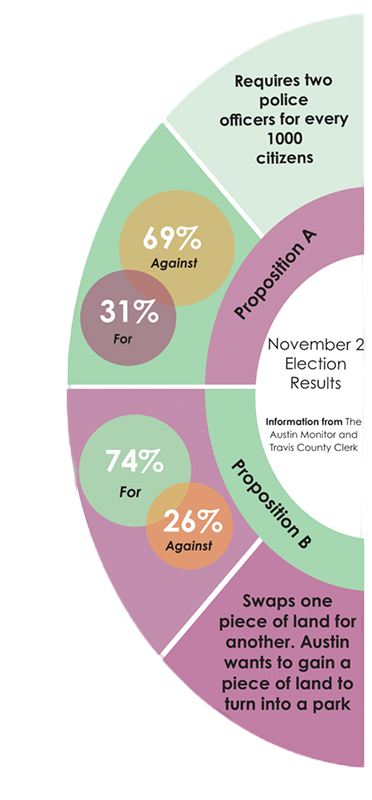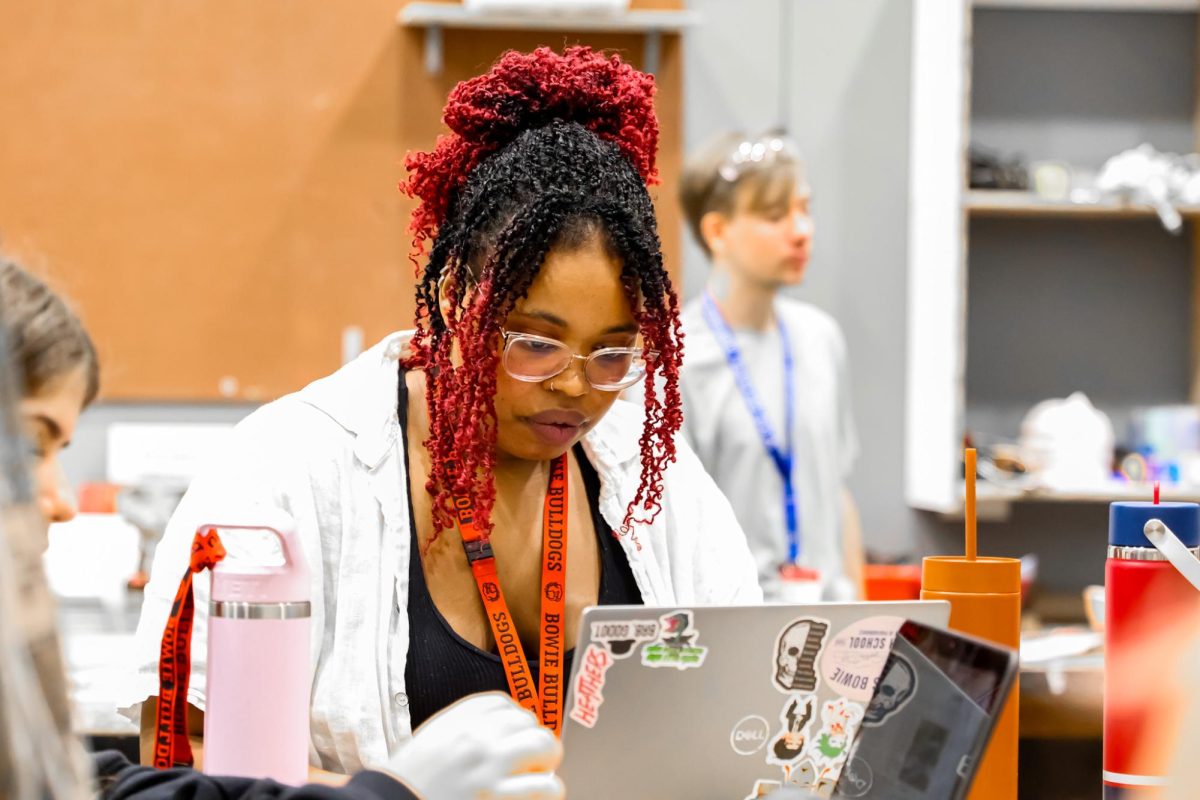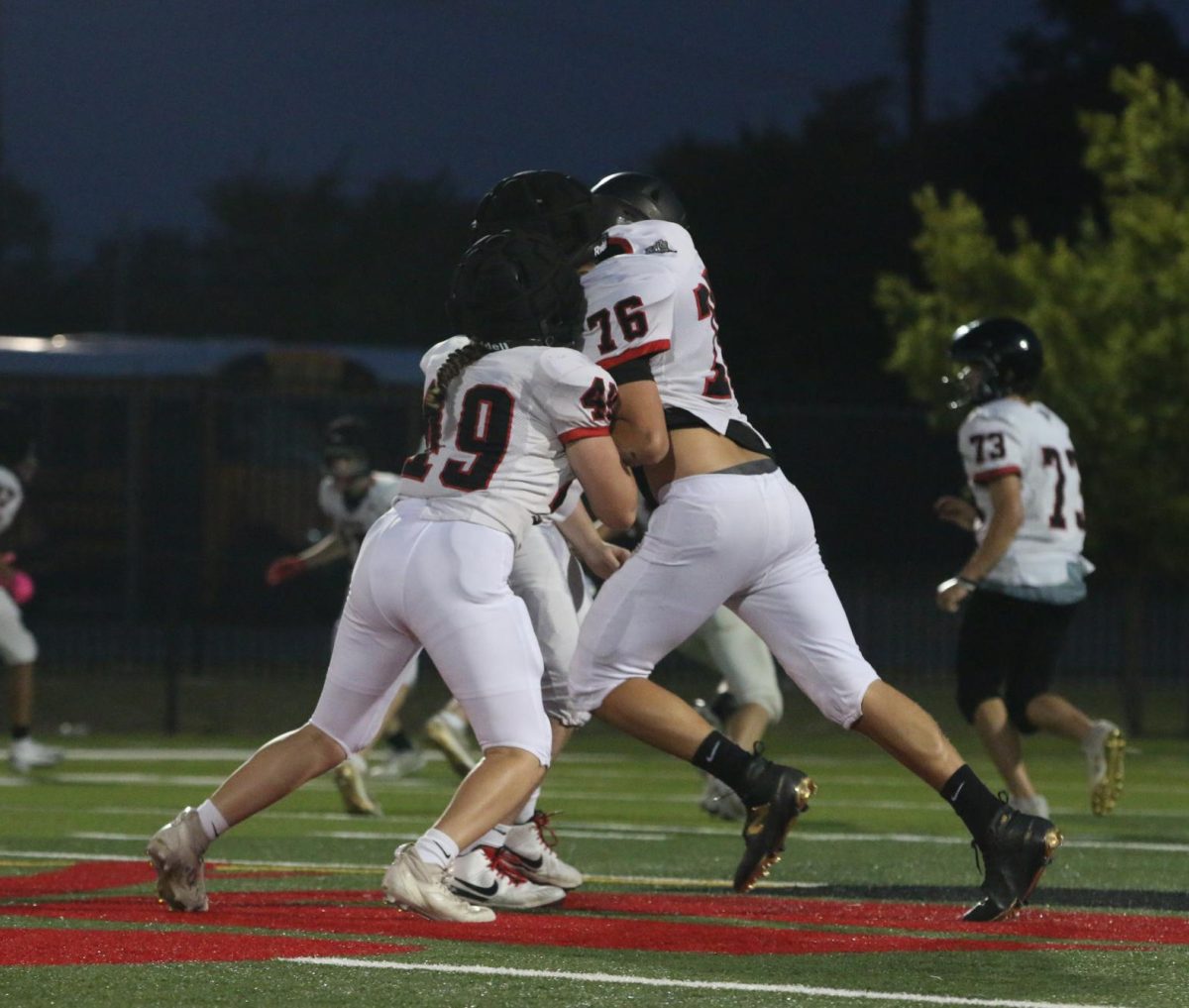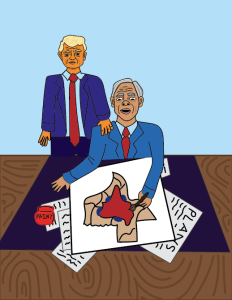Prop A and Prop B debates: policing and parkland space
Critics believe the proposed budget is a mis-allocation of resources, while supporters believe it’s a necessary amount for improving safety in Austin. Equity PAC, another local organization, formed the opposing campaign No Way Prop A to convince voters not to pass this proposal.
November 15, 2021
Voters overwhelmingly reject Prop A, pass prop B, according to election results
Austin voters decided the future of two local propositions on the Nov. 2, 2021 city elections. On the ballot, there were two propositions that Travis County citizens will make decisions on, Prop A and B.
Prop A is aimed at increasing staffing for the Austin Police Department (APD). Suggested by the local political action community (PAC) Save Austin Now, Prop A presents the requirement of 20 sworn officers for every 10,000 Austin citizens. Save Austin Now co-founder Cleo Petricek has said that APD’s officer shortage is putting the community in harm’s way, including a rise in homicides and delayed response times.
“Prop A is very political, and I think it goes all the way back to the fallout of the George Floyd murder,” AP government teacher Dalton Pool said. “All the protests and the actions of many city councils, including our own, caused a decrease in police funding. After that, the Save Austin Now PAC had a lot of [political] success, and now they’re picking up this political agenda item to expand police funding in reaction to the original decreases.”
Save Austin Now also requests standing officers to be issued a minimum of “35 percent community engagement time”, meaning time spent not responding to calls. In addition, if it’s passed, Prop A will require every officer to participate in 40 hours of post-cadet training each year.
“Tying back to Black Lives Matter, it is important for [officers] to get more training and psychological background training just to make sure there’s not the racial biases and prejudice in the police system,” senior Livia Power said. “But I don’t know if it needed to be done, [and] if that much money is necessary for that training.”
These changes are expected to cost the city of Austin somewhere between $54.3 million to $119.8 million per year for the next five years. This is added on top of the department’s new yearly budget of over $443 million, the highest allowance the APD has ever had. These budget changes would also reverse the 2020 funding cuts that were made in response to local BLM protests.
“The fact that the city just passed a [new] police budget should be plenty for the police department to do their jobs, and to keep the city safe,” Pool said. “Whether or not the city has [enough] money right now, is also in question. If it meant taking that money from other places and moving it towards the police after already passing a large police budget, that’s something I’d be skeptical of.”
Critics believe the proposed budget is a mis-allocation of resources, while supporters believe it’s a necessary amount for improving safety in Austin. Equity PAC, another local organization, formed the opposing campaign No Way Prop A to convince voters not to pass this proposal. Leaders of this association agree that Austin doesn’t have the funds for this proposition, and some members also believe that the police department is systematically unjust.
“The bottom line is, the way we do policing now does not make us feel safe. We don’t need more cops,” Austin Justice Coalition founder Chas Moore said at the No Way Prop A launch event. “We need more resources for pools, we need more resources for mental health, we need more resources to go invest in our communities.”
Instead of spending money on the APD, opponents believe the money could go to funding different public administrations in Austin. They believe that other systems of Austin’s community could be improved with the kind of funding that Prop A suggests for the police force.
“There’s a lot of different avenues that I think the money could be spent on,” Pool said. “The city has done a pretty good job of improving our park system, but I think there’s a lot more they can do. Also, the healthcare industry is really struggling right now, especially with COVID, hospitals are struggling with hiring. The city could get involved in those areas.”
Prop. B is the other issue on the ballot, and it is in regards to the City of Austin asking for permission to trade one piece of land for another.
The land being traded away is nine acres of city-owned property on which Austin’s Parks and Recreation Department has a storage and supplies facility. The city has deemed these buildings insubstantial for their purposes, so the property on which they stand will be traded for land from the highest bidder, likely to be Oracle, a software company with headquarters in Austin.
“I’m expecting most people to say yes, and that we do get that more of the parkland, because [we will] still have maintenance sites, it’s not like they’re going to completely stop taking care of the parks,” Power said. “And I think people will enjoy it, especially since some people are still cautious about COVID, [and] it provides more park space to spread out and not be super close.”
Because this property is considered parkland, the city needs voters’ permission to sell it, as both state law and Austin’s city charter require citizen approval with the selling of a city-owned park.
“Austinites really take their downtown parks space seriously, it’s part of our culture. So I feel like it is important [to vote on this], especially as more people are moving here and [our parks] are getting super crowded on the weekends,” Power said. “I do believe it’s somewhat of a formality, [as well as] a cultural thing for Austinites.”
Although Prop B was approved, the deal isn’t immediately finalized, it just opens up the nine acres to any bidders interested, which would then need to be approved by the City Council. Land on the edge of the Colorado River is being considered for this trade.
“While we don’t know the final construction of the land exchange,” Pool said. “I think we know enough as a city to give them our consent – or not consent – when it comes to this time.”
Props A and B are the only propositions for Travis County voters on the November ballot. Campaigning has taken place in hopes to get a wide range of voters, including first time voters, to the polls in November.
“A functioning democracy works best when more and more people are engaged and educated on the material,” Pool said. “It’s a civic duty to vote, and it’s our responsibility. We need to realize the effect that our government – whether it’s local, state, or federal – has on us, and voting is our key way of sharing our opinion on different issues, and it’s the most obvious way that we affect our government. I encourage all seniors who are 18 to go vote and do their civic duty.”









